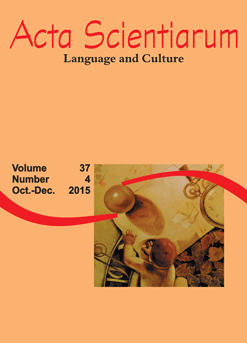<b>Language, cognition and reference in A maçã no escuro
Abstract
This article addresses the relationship between the questioning of language in A maçã no escuro, by Clarice Lispector, and the conceptual trajectory of reference. Leaning on the theoretical contributions which support the transformations involved in this trajectory up to the construction of the referential concept, we analyzed passages of the novel which we considered associated with the ‘cognition, language and reference’ triad. Our analysis consisted of examining these passages in light of the philosophical discussion about the truth issue; the awakening of Linguistics to the importance of the discursive dimension of referring acts and the construction of the socio-cognitive hypothesis as an alternative to the conflict which was raised between essentialism and radical relativism. The results we found indicate the presence of a constant tension in the path taken by the protagonist in the novel, a tension that incorporates, in a certain way, a paradigmatic crisis which is similar to the one that characterizes language studies; and highlight the character’s assumption, at the end of the narrative, of a conception according to which through language we shape the world, a conception that is therefore analogous to the socio-cognitivist vision.
Downloads
Metrics
DECLARATION OF ORIGINALITY AND COPYRIGHTS
I Declare that current article is original and has not been submitted for publication, in part or in whole, to any other national or international journal.
The copyrights belong exclusively to the authors. Published content is licensed under Creative Commons Attribution 4.0 (CC BY 4.0) guidelines, which allows sharing (copy and distribution of the material in any medium or format) and adaptation (remix, transform, and build upon the material) for any purpose, even commercially, under the terms of attribution.
Read this link for further information on how to use CC BY 4.0 properly.




















6.png)









